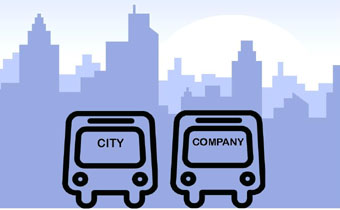
City Buses, Company Shuttles
| Wednesday, January 8, 2014 |By R. Alan Clanton
Thursday Review editor
In a crowded city with major infrastructure challenges and pollution concerns, businesses which offer their own employees access to a company-owned and managed shuttle bus would seem not only a natural fit, but also a gift for the city itself—reducing public transportation demands and minimizing the number of cars on the city’s roads.
It’s a win-win, politically and socially. Well, maybe not.
In San Francisco, protesters have escalated the issue to the point that the city is now intervening, taking action against several large companies which offer their own shuttle services or privately run transportation systems.
The businesses—among them Google and Apple—employ thousands at various campuses around the city, and to add to their employees’ benefits and improve efficiency (not to mention reducing parking problems at company facilities), operate their own small bus and shuttle lines. But the city, under pressure from protesters and some politicians, is asking that those companies begin to pay a fee based on the number of stops and the passenger capacity of the shuttles.
The problem, some say, is that the private shuttles use many of the same stops and pick-up points as the city. City buses, which are expected to run on time between stops, are sometimes being delayed by the private shuttles, which often operate at full capacity. Additionally, those passengers using the company buses must compete for the same sidewalk or bus stop space as those who want to ride on the public buses.
And there is another problem, more socially complex perhaps. Those company-owned buses have, for some protesters, become a symbol of inequality and injustice. Why? Because workers with jobs at the high tech firms and computer-makers now have access to services for which others are denied, or, at the very least, are required to use because of their economic status in an economy beset by recession and unemployment.
San Francisco Mayor Ed Lee recently announced a plan wherein the city and those major firms would work together to agree upon appropriate fees to offset the logistical and infrastructure problems. The plan may also require company shuttles to defer to city buses if their arrivals at the same stop coincide.
Google said it would be happy to cooperate with city officials, and the Mayor stressed that those company shuttles provide an invaluable service to the city by greatly reducing traffic stresses and mitigating air pollution.
But the complaints, especially in some neighborhoods, seem to go beyond merely the inconvenience of the additional buses and shuttles on crowded, narrow streets, and the protesters are making the issue into something larger and more transcendent than the reduction of greenhouse gases. According to the protesters, the issue is injustice and fairness. Some have jobs, some do not.
In Oakland recently protesters became violent and broke the windows of one bus carrying employees to a Google facility. Other protesters have blocked passage of the shuttles and have threatened to damage other company buses. The complaints and protests have been especially ugly in the Mission District, a neighborhood extremely popular with employees of high tech firms, and an area which has become symbolic—to some—for the rapid disconnect technology may have caused in some working communities.
It has become an issue of fairness, for many. Haves, versus have-nots. Sort of.
So…a company which employs thousands offers reliable mass transportation to its employees, in the process reducing traffic congestion, pollution and carbon emissions is being protested against because of their…shuttle buses?
We’re not sure if we want to take a position here, so we’ll let you decide.
